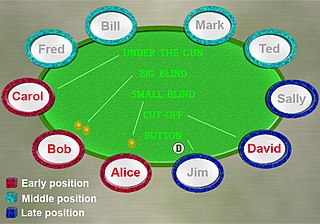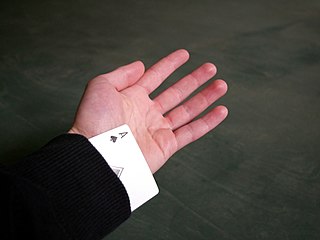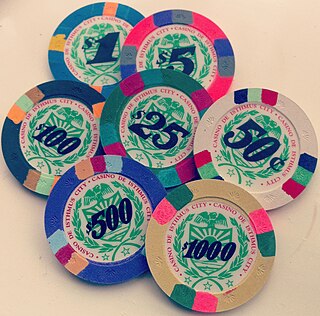
Blackjack is a casino banking game. It is the most widely played casino banking game in the world. It uses decks of 52 cards and descends from a global family of casino banking games known as "twenty-one". This family of card games also includes the European games vingt-et-un and pontoon, and the Russian game Ochko. The game is a comparing card game where players compete against the dealer, rather than each other.

Craps is a dice game in which players bet on the outcomes of the roll of a pair of dice. Players can wager money against each other or against a bank. Because it requires little equipment, "street craps" can be played in informal settings. While shooting craps, players may use slang terminology to place bets and actions.
Pai gow poker is a version of pai gow that is played with playing cards, instead of traditional pai gow's Chinese dominoes. The game of pai gow poker was created in 1985 in the United States by Sam Torosian, owner of the Bell Card Club.

Let It Ride is a casino table game based on poker, where the player wagers on a five-card poker hand formed by their own three cards and two community cards. It is a product of Bally Technologies, under its Shuffle Master brand.

In the game of poker, the play largely centers on the act of betting, and as such, a protocol has been developed to speed up play, lessen confusion, and increase security while playing. Different games are played using different types of bets, and small variations in etiquette exist between cardrooms, but for the most part the following rules and protocol are observed by the majority of poker players.

Cheating in poker is any behavior outside the rules of poker that is intended to give an unfair advantage to one or more players.

Hazard is an early English game played with two dice; it was mentioned in Geoffrey Chaucer's Canterbury Tales in the 14th century.

Casino chips are small discs used as currency in casinos. Larger, rectangular gaming plaques may be used for high-stakes games. Poker chips are also widely used as play money in casual or tournament games, are of numismatic value to casino chip collectors, or may be kept as souvenirs.

Card counting is a blackjack strategy used to determine whether the player or the dealer has an advantage on the next hand. Card counters try to overcome the casino house edge by keeping a running count of high and low valued cards dealt. They generally bet more when they have an advantage and less when the dealer has an advantage. They also change playing decisions based on the composition of the deck and sometimes play in teams.
Vigorish is the fee charged by a bookmaker for accepting a gambler's wager. In American English, it can also refer to the interest owed a loanshark in consideration for credit. The term came to English usage via Yiddish slang which was itself a loanword from Russian.

Cee-lo is a gambling game played with three six-sided dice. The name is derived from the Chinese name for the game, which is literally the numerical sequence four-five-six. Although many variations exist, there are certain common rules, including the use of three dice and common roll combinations, such as rolling a 4-5-6 to win, 1-2-3 to lose, and other combinations which establish a point for comparison to rolls by other player(s).

Sic bo, also known as tai sai (大細), dai siu, big and small or hi-lo, is an unequal game of chance of ancient Chinese origin played with three dice. Grand hazard and chuck-a-luck are variants, both of English origin. The literal meaning of sic bo is "precious dice", while dai siu and dai sai mean "big [or] small".
Cheating in casinos refers to actions by the player or the house which are prohibited by regional gambling control authorities. This may involve using suspect apparatus, interfering with apparatus, chip fraud or misrepresenting games. The formally prescribed sanctions for cheating depend on the circumstances and gravity of the cheating and the jurisdiction in which the casino operates. In Nevada, for a player to cheat in a casino is a felony under state law. In most other jurisdictions, specific statutes do not exist, and alleged instances of cheating are resolved by the gambling authority who may have more or less authority to enforce its verdict.
MindPlay was a technology designed to monitor blackjack players' actions while playing in a casino, first released in 2003 and discontinued in 2007.
John Ferguson, known by his pen name, Stanford Wong, is a gambling author best known for his book Professional Blackjack, first published in 1975. Wong's computer program "Blackjack Analyzer", initially created for personal use, was one of the first pieces of commercially available blackjack odds analyzing software. Wong has appeared on TV multiple times as a blackjack tournament contestant or as a gambling expert. He owns a publishing house, Pi Yee Press, which has published books by other gambling authors including King Yao.
"Gonna Roll the Bones" is a fantasy novelette by American writer Fritz Leiber, in which a character plays craps with Death. First published in Harlan Ellison's Dangerous Visions, it won both the Hugo Award and Nebula Award for Best Novelette.
Advantage gambling, or advantage play, refers to legal methods used to gain an advantage while gambling, in contrast to cheating. The term usually refers to house-banked casino games, but can also refer to games played against other players, such as poker. Someone who practices advantage gambling is often referred to as an advantage player, or AP. Unlike cheating, which is by definition illegal, advantage play exploits innate characteristics of a particular game to give the player an advantage relative to the house or other players. While not illegal, advantage play may result in players being banned by certain casinos.
The following is a glossary of poker terms used in the card game of poker. It supplements the glossary of card game terms. Besides the terms listed here, there are thousands of common and uncommon poker slang terms. This is not intended to be a formal dictionary; precise usage details and multiple closely related senses are omitted here in favor of concise treatment of the basics.

Las Vegas is a board game designed by Rüdiger Dorn and published by Ravensburger in 2012. It is named after the city of Las Vegas in Nevada, United States and has a gambling theme. The game was also nominated for the Spiel des Jahres prize in 2012.

The following is a glossary of terms used in the dice game craps. Besides the terms listed here, there are many common and uncommon craps slang terms.













